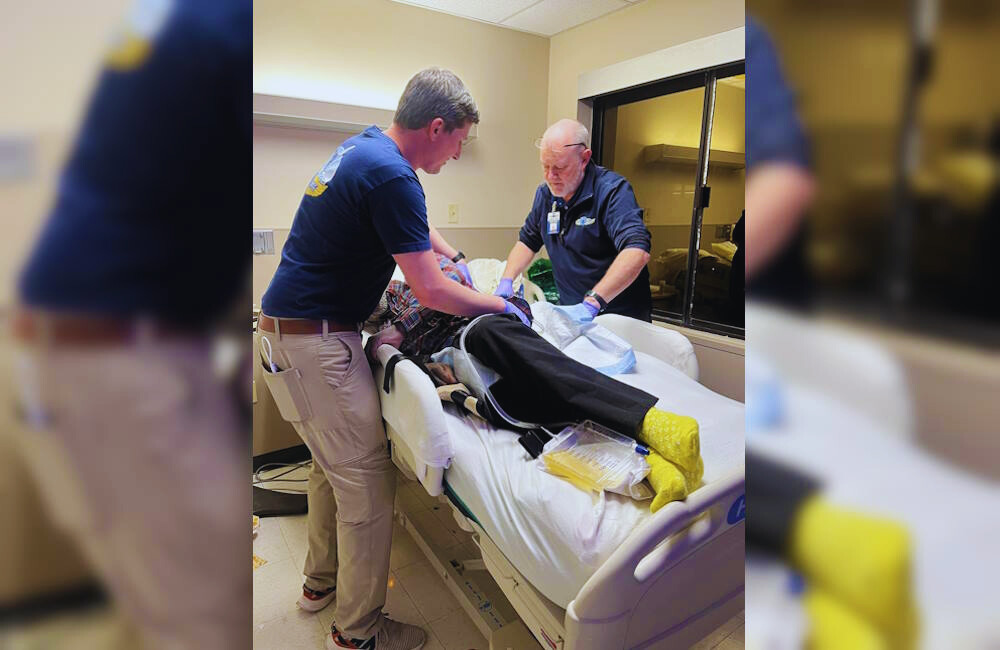
Fragility in medical transport poses significant challenges that demand specialized care and meticulous planning. Fragile patients — who may include the elderly, those with chronic illnesses, or individuals with severe disabilities — require a higher level of attention to ensure their safety and comfort during non-emergency medical transport (NEMT).
It’s a service Flying Angels often provides as part of its medical flight services or hospital discharge transportation. Flying Angels specializes in booking trips and providing flight nurses for patients traveling by commercial airlines. They also offer ground transportation.
Flying Angels Managing Director Bob Bachelor said the NEMT services they provide can handle people in all kinds of fragile states, “Whether it’s the grandma who got some dementia going from one nursing home in Florida to a nursing home in Philadelphia who just needs a little bit of help all the way, up to patients on ventilators on international flights to India or China.”
Fragility in Medical Transport: Some of the Precautions NEMT Companies Take
Transporting fragile patients with NEMT services requires special considerations and precautions to ensure their well-being. Some key precautions include the following.
Comprehensive patient assessment. Before transporting a fragile patient, a thorough assessment of their medical condition, mobility limitations, and specific needs is essential. This assessment should include medical history, mobility needs, and determining whether the patient requires a wheelchair, stretcher, or assistance with walking. Special equipment is often needed. For example, Flying Angels has specially designed wheelchairs to safely move patients.
Customized transport vehicles. Quality NEMT services use vehicles equipped to manage the specific needs of fragile patients. Key features might include accessibility ramps, lifts, and securement systems for wheelchairs and stretchers.
Trained personnel. The staff involved in transporting fragile patients should have specialized training in patient handling, medical monitoring, and basic life support skills. Flying Angels always has experienced flight nurses traveling with patients. They have emergency room experience and training for delivering healthcare services at high altitudes.
Precautionary measures. Several precautionary measures are critical to the safe transport of fragile patients. They include pre-trip planning, such as having detailed flight schedules and contacting airlines and airports ahead of time to ensure a patient has any special accommodations they need (such as boarding early on the plane).
Coordination with healthcare providers. Effective coordination with healthcare providers is vital for the safe transport of fragile patients. This includes having clear instructions from the patient’s healthcare team regarding their care needs during transport and ensuring a smooth transition of care when the patient reaches their destination.
Patients Considered Fragile in Medical Transport
During medical transport, several types of patients are typically considered fragile due to their medical conditions, physical limitations, or specific healthcare needs. These patients require extra care and precautions to ensure their safety and comfort.
Elderly Patients
Older adults often have multiple chronic conditions, reduced mobility, and a higher risk of complications during transport. Conditions like dementia or Alzheimer’s disease require careful handling and monitoring.
Patients with Chronic Illnesses
Patients with heart conditions may need continuous monitoring and specialized equipment. For example, those with chronic obstructive pulmonary disease (COPD) or severe asthma may require oxygen therapy during transport.
Patients with Severe Disabilities
Those with limited mobility or paralysis need specialized equipment such as wheelchairs, lifts, or stretchers. Patients with conditions like multiple sclerosis or muscular dystrophy also have complex needs.
Post-Surgical Patients
Individuals recovering from major surgeries require careful handling to avoid complications like bleeding or infections. Post-surgical patients often need pain management during transport, necessitating skilled medical professionals.
Pediatric Patients
Pediatric patients, especially those with congenital conditions or severe illnesses, require specialized care and equipment. Children with developmental disabilities or complex medical conditions need tailored pediatric transport solutions.
Patients with Mental Health Conditions
Those with significant mental health issues may need emotional support and reassurance during transport. Patients with severe psychiatric conditions may require secure and safe transport arrangements.
Patients with Severe Injuries
Those with severe injuries from accidents or other trauma need immobilization and careful handling to prevent further injury. Patients with extensive burns require a controlled environment to manage pain and prevent infection. Transporting fragile patients requires a detailed understanding of their specific needs, proper planning, and specialized equipment. Ensuring that medical transport personnel are adequately trained and equipped to manage these diverse needs is crucial for the safety and well-being of fragile patients.
